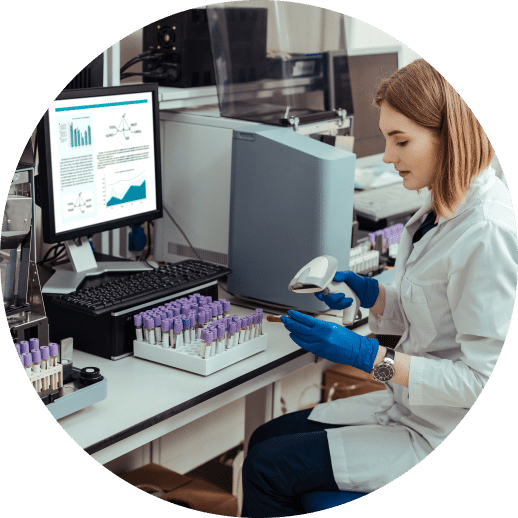Turn-around times
The GLH aims to report all genomic tests within the NHS England genomic test reporting time guidelines.

Please note that reporting times will vary depending on the test type and referral type.
It is essential that the correct and complete referral information is sent so that testing can be appropriately prioritised. Please use our “Request a Test” tool for information on specific tests, or view the national genomic test directories.
The national guideline turnaround times for different types of test are listed in the table below.
| Clinical urgency | Category | Sub-categories | Calendar days | Examples |
|---|---|---|---|---|
| Urgent | Ultra rapid | N/A | 3 days | QF-PCR for rapid trisomy detection |
| Urgent haemato-oncology FISH/RT-PCR | ||||
| PCR-based tests where the result is needed urgently for prenatal diagnosis | ||||
| Urgent | N/A | N/A | 5 days | DYPD |
| Urgent | Ultra rapid | N/A | 7 days | NIPT |
| Urgent | Rapid | Rapid | 14 days | Microarray for prenatal / urgent postnatal (e.g. neonatal referrals) |
| Urgent Haemato-oncology karyotyping | ||||
| Mutation specific molecular pathology tests | ||||
| Southern blot tests where the result is needed urgently for prenatal diagnosis | ||||
| PCR-based tests for predictive testing and confirmation of neonatal results | ||||
| Complex rapid | 21 days | Urgent panels and exomes for relevant indications NIPD Karyotyping or where cell culture is required for prenatal testing | ||
| Non-urgent | Standard | Somatic cancer | 21 days | Standard HO karyotyping (e.g. MDS) NGS panels for HO referrals NGS panels for molecular pathology referrals |
| Rare disease | 42 days (6 weeks) | Standard paediatric microarray Known familial mutation testing Standard STR based analysis Postnatal karyotyping (e.g. fertility or familial microarray follow-up) Single gene sequencing or gene-panels (irrespective of number of targets/genes) or WES for standard referral indications | ||
| Non-urgent | Complex standard | Rare disease cancer | Part a) 42 days (6 weeks) | Expectation for delivery of centralised WGS (from DNA sample receipt to data dispatched to decision support service ready for GLH analysis) |
| Part b) 42 days (6 weeks) | Validation/reporting of centralised WGS results after receipt of data in the decision support service ready for GLH analysis. For clarification, GLHs are expected to report performance in relation to this, Part B, section of the WGS pathway. | |||
| Non-urgent | Research and diagnostic discovery confirmation | Rare disease | 84 days | Confirmation and/or NHS clinical interpretation and reporting of research findings (e.g. Diagnostic Discovery) R447 and R370 only |
Backlog clearance
We have been looking at ways to reduce our backlog of Specialist NGS tests and one of the initiatives we are implementing is outsourcing some specific clinical indications to Medicover in Germany. We are also outsourcing some Microarray tests to Medicover Greece (R377). Medicover is an ISO15189:2022 accredited laboratory.
This will be for the following clinical indications only.
| R28.1 | Congenital malformation and dysmorphism syndromes (microarray) |
| R39 | Albinism or congenital nystagmus |
| R41 | Optic neuropathy |
| R46 | Congenital fibrosis of the extraocular muscles |
| R59.2 | Early onset or syndromic epilepsy (microarray) |
| R67 | Monogenic hearing loss |
| R107 | Bardet Biedl syndrome |
| R163 | Ectodermal dysplasia |
| R165 | Ichthyosis and erythrokeratoderma |
| R166 | Palmoplantar keratodermas |
| R194 | Haematuria |
| R195 | Proteinuric renal disease |
| R198 | Renal tubulopathies |
| R230 | Multiple monogenic benign skin tumours |
| R236 | Pigmentary skin disorders |
| R237 | Cutaneous photosensitivity with a likely genetic cause |
| R256 | Nephrocalcinosis or nephrolithiasis |
| R262 | Corneal dystrophy |
| R326 | Vascular skin disorders |
| R332 | Rare genetic inflammatory skin disorders |
| R377 | Intellectual Disability (Microarray) |
| R424 | Subcutaneous panniculitis T-cell lymphoma (SPTCL) |
Newly received samples are being exported; where testing has already started in house this will be completed by us. Reporting will not therefore be in the order samples are received while we work to clear the backlogs for testing.
Please continue to send requests for these indications to us at the usual address as per the test directory routing. We will forward samples to Medicover and then forward the final report to you once it is received. The expected turnaround time (from receipt of sample at Medicover to report being issued) is 42 days.
If you have any enquiries please contact the laboratory on gos-tr.norththamesgenomics@nhs.net